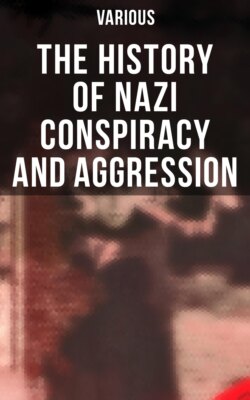Читать книгу The History of Nazi Conspiracy and Aggression - Various - Страница 79
На сайте Литреса книга снята с продажи.
ОглавлениеTHEODOR KLEFISCH
LAWYER
COLOGNE, 43, BLUMENTHALSTRASSE
To: The International Military Tribunal Nurnberg.
As defending counsel to the accused Dr. Gustav Krupp von Bohlen und Halbach I beg to state that the proceedings against this accused be deferred until he is again fit for trial.
At any rate I request that the accused be not tried in his absence.
Reasons
By Article 12 of the Statute of the International Military Tribunal this court has the right to try an accused in his absence if he cannot be found, or if the court deem this necessary for other reasons in the interest of justice.
The 75 year old accused Krupp von Bohlen has for a long time been incapable of trial or examination owing to his severe physical and mental infirmities. He is not in a position to be in contact with the outside world nor to make or receive statements. The indictment was served on him on the 19th October 1945 by a representative of the International Military Tribunal by placing the document on his bed. The accused had no knowledge of this event. Consequently he is not aware of the existence of an indictment. Naturally therefore he is not capable of communicating either with his defense counsel nor with other persons on the subject of his defense.
To prove the above, 2 medical certificates are enclosed viz. that of the court medical expert Doctor Karl Gersdorf of Werfen Salzburg of 9th September 1945 and that of the Professor Doctor Otto Gerke of Bedgnstein of 13th September.
Latterly Herr Krupp von Bohlen has been examined several times by American military doctors. As far as it is possible I should like to request for another complete medical examination. If the accused is unable to appear before the court, then according to article 12 of the statute he could only be tried if the court deemed it necessary in the interests of justice.
Whatever may be understood by the phrase “in the interests of justice” it would hardly be objective justice to try a defendant accused of such serious crimes, if he were not informed of the contents of the accusations or if he were not given the chance to conduct his own defense or instruct a defense counsel. Particularly is he in no condition to comprehend the following rights of an accused set out in the statute:
1. By article 16 Section (a) of the statute a copy of the indictment in a language which he understands will be served on the accused at a suitably appointed time. In the first place this concerns the statement which the accused has to render on inquiry as to whether he admits his guilt or not, a statement which is of particular importance for the course of the trial and for the decision of the tribunal. This is all the more important as this statement regarding guilt or innocence can only be made exclusively by the accused himself according to his own judgment and after examining his conscience. So far as the procedure is admissible at all, the defense counsel could not at the request of the court express himself on the question of guilt as such a declaration presupposes the possibility of communication and understanding with the accused.
Also the defendant could not exercise the right to the last word to which he is entitled according to Article 24 Section f.
The legislators who set up these guarantees for the defense, cannot wish to deny them undeservedly to an accused who cannot make use of them owing to illness. If by Article 12 of the statute the trial of an absent defendant is allowed then this exception to the rule can only be applied to a defendant who is unwilling to appear though able to do so. As is the case with the criminal procedure rules of nearly all countries, it is on this principle that the rules and regulations concerning the trial of absent defendants are based.
[signed] Klefisch
Lawyer
